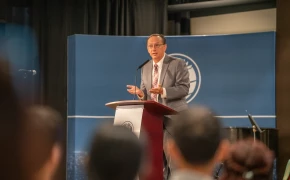CONVOCATION: Iorg on calling to leadership

Gateway President Jeff Iorg launched the fall chapel series by speaking on the nature of God’s call to ministry leadership.
Ontario, Calif. -- Gateway President Jeff Iorg launched the fall chapel series by speaking on the nature of God’s call to ministry leadership.
Iorg began the fall convocation on August 25, by welcoming new and returning students as well as faculty and staff. He specifically recognized staff in the enrollment and student services offices for their efforts. Fall 2022 student headcount is the largest number of enrolled students at Gateway in more than twenty years. The credit hours enrolled is the largest since Fall 2006. The DMin program is at an all-time high with 282 current students.
“We celebrate the growth God is giving us and the strength we have recovered,” Iorg said, referring to both the campus relocation in 2016 and the recent complications caused by the pandemic.
Then he introduced the theme of Gateway’s fall chapel series on David. Chapel speakers are scheduled to preach through key moments in David’s life in First Samuel.
“We are trying to answer this question: ‘How did God form a leader from call to commission?’” Iorg said.
“My task this morning is just the first message, and that is God's call.”
Iorg said one reason people misunderstand the concept of ‘God’s call’ is the lack of a “specific definition.” He defined it as “a profound impression from God that establishes parameters for your life, and can only be altered by a subsequent superseding impression from God.”
It is a definition Iorg developed over years of study and published more than fifteen years ago in his book, Is God Calling Me? Iorg further described three elements of this definition in greater detail.
First, Iorg contrasted the “profound impression” of a calling experience with other words like leading, guiding, directing, or prompting. “I sometimes say it this way: After all the analysis is done, you ultimately say ‘I am called’ because I know it in my heart.”
Second, a calling establishes parameters in a person’s life. “For example,” he said, “a called person can only consider a marital partner who has a similar call to ministry leadership.”
Third, Iorg said a calling is permanent, “until God calls again.”
“In other words, when you’re called, you stay called.”
Iorg then outlined three types of ministry callings Christians experience.
“One of the most common questions I'm asked is, ‘Are all Christians called?’ and the answer is “Yes, but…’” he said.
“Yes, all Christians are called to serve and to grow, so in that sense, all Christians are called.”
Iorg cited Ephesians 4:1-3, “walk worthy of the calling you have received,” and Peter 1:15, “Be holy as you are called to be holy,” as biblical examples of a general calling, to all believers, to service and growth. Iorg said the majority of Christians answer this call with a secular career that is an avenue for Christian service and growth.
“We need to learn, as ministry leaders, to teach and celebrate this calling,” Iorg said.
The second type of calling is a general call to ministry leadership, Iorg said. He warned this type of calling is often given confusing colloquialisms, like a ‘calling to vocational service’ or ‘full-time Christian service.’
“Those descriptions only work in the southern United States or other churched cultures.”
“Most people in the world who have experienced a call to ministry leadership don’t get a salary, have medical insurance, or a retirement plan,” Iorg said. He emphasized a global understanding of calling means it has to be applicable in every culture and context. “This means we define calling by a responsibility we assume, not a vocation we practice.”
Iorg shared a biblical example of how a call to ministry leadership differs from a general call to service and growth. Peter became a follower of Christ and remained a commercial fisherman (John 1:40-42). Later, Jesus invited Peter to devote himself to kingdom leadership (Luke 5:1-11).
The third type of calling is to a specific ministry assignment. “If you receive a general call to ministry leadership, at least once in your lifetime, you will experience this third kind of call,” Iorg said.
Iorg concluded the message by outlining three ways God calls people – a sudden experience, a reasons process, and through the prompting of others. While each of these can be distinct experiences, they also often blend together as God uses various means to communicate and confirm his call.
Finally, Iorg described the goal of the fall 2022 chapel series on David’s experience from call to commission.
“We are going to look at the stories of David’s life; what we can learn from them; what they teach us about leadership formation and becoming the people God wants us to be as we move towards that ‘commission moment’ when God sends us to do the work we are assigned by him,” Iorg said.
--30--
